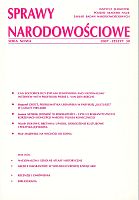Jedność w rozmaitości - czyli o romantycznych korzeniach koncepcji narodu Feliksa Koniecznego
Unity In diversity, or the Romantic Roots of Feliks Koneczny's Idea of the Nation
Author(s): Joanna NowakSubject(s): Cultural history
Published by: Instytut Slawistyki Polskiej Akademii Nauk
Keywords: the history of thought; the philosophy of history in the 20th century; the idea of the nation; Feliks Koneczny
Summary/Abstract: The article investigates the Romantic origins of the views on the idea of the nation expressed by Feliks Koneczny, a Polish historian and specialist in the philosophy of history at the turn of the 20th century. It compares the thought of Koneczny with that of the Romantics in reference to such ideas as the nation, culture, state, and civilization. The analysis confirms that the two attitudes are united, first of all, in assuming that the nation and the general understanding of the world have a pluralistic basis, while their uniformity is absolutely artificial, and is thus against nature, and—for the Romantics—even opposes the plan of Providence. These assumptions have had a great impact on the definition of the nation—perceived as a union which is homogeneous in terms of ethnicity—as a historical community of thought and feelings. In turn, monism was perceived as binding in the ethical kingdom, due to the Romantic principle of ‘unity in diversity.' Both attitudes also emphasize personalism, oppose coercive power in relations between communities and acknowledge the value of free will. The nation is seen by both bodies of thought as an organism, entirely different from the artificial communities which Koneczny terms ‘mechanisms.' He also believed in moral principles in politics but opposed, as very harmful, the so-called 'policy of feelings,' vastly postulated in the Romantic period.
Journal: Sprawy Narodowościowe
- Issue Year: 2007
- Issue No: 30
- Page Range: 75-94
- Page Count: 20
- Language: Polish

